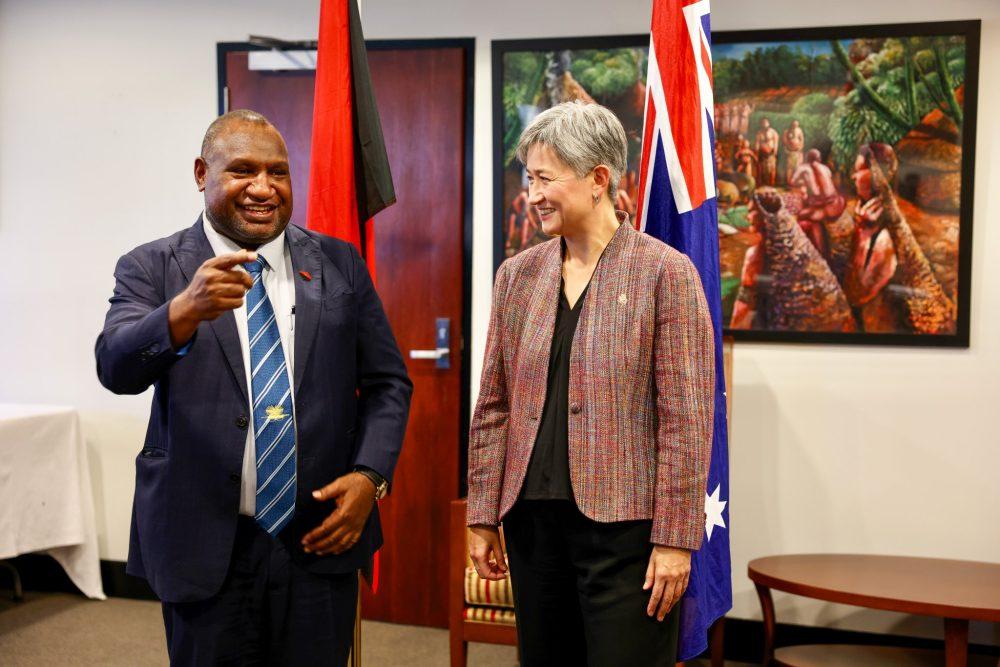
The first visit to Papua New Guinea by Foreign Minister Penny Wong was probably a success the moment she arrived in Port Moresby.
It removed, or at least eased, one longstanding irritant in the Australia–PNG relationship. It has not gone unnoticed in Prime Minister James Marape’s re-elected government that the first visit was by the foreign minister and not by a junior ‘minister for the Pacific’.
Delegating our important bilateral relationship to a junior minister has long been an annoyance—the two countries are supposed to be equal partners, yet while PNG has the relationship managed by its foreign minister, Australia has for much of the last 30 years delegated it to a minister often not even in the cabinet.
Wong would be wise to continue a hands-on approach, perhaps delegating to the minister for the Pacific management of the generous development assistance program.
The more she engages with Marape and her new PNG counterpart, Justin Tkatchenko, the better.
A second ‘irritant’ has helpfully been removed. Like other Pacific island nations, PNG was offended by what it regarded as an uncaring approach by Australia to climate change. Prime Minister Anthony Albanese’s policy commitments on global and regional climate issues are warmly welcomed by the PNG government.
There will be challenges—especially when it comes to funding climate change initiatives in PNG.
Significant parts of the country are experiencing severe drought. In a nation dependent on hydro power in key cities and communities, drought has a double-whammy impact—it affects farmers in rural areas as well as electricity users generally.
But a more complex factor has helped strengthen relations between Australia and Papua New Guinea: the growing impact of China in the region.
PNG has a ‘one China’ policy, but increasingly the heavy-handed Chinese approach to regional relationships worries key figures in its new government.
In the pre-election Marape cabinet, foreign affairs was held by an openly pro-China minister, Sorio Ere. He has been demoted to the relatively insignificant provincial government ministry.
Tkatchenko was very forthright in his comments at a joint press conference with Wong.
PNG, along with most Pacific Island Forum members, firmly rejected China’s demand they all sign security agreements with Beijing.
The new foreign minister wants to reach an agreement with Australia on a bilateral security agreement for the first time since PNG gained independence from Australia in 1975.
As Tkatchenko spoke, Deputy Prime Minister and Defence Minister Richard Marles proposed a greater upgrading and wider development of the Lombrum naval base on Manus Island.
The current upgrading funded by Australia and the United States is modest by any measure. It won’t facilitate the berthing of larger international naval vessels.
Marles knows PNG better than any other Australian politician. He is widely respected there, and a more extensive upgrading of the base and a security agreement will be strongly in Australia’s national interest. If they go ahead, they’ll mark a new era of cooperation in an aspect of government that has been somewhat neglected in recent years.
The PNG government must to contend with the fallout from a very divisive election period. It will need to strengthen its police and defence force urgently and rebuild public confidence in both organisations, especially the police.
The funding of both the police and the defence force simply does not rate highly in a tight fiscal environment in which members of the public demand funding for roads, schools and health centres.
A security agreement with Australia will inevitably require serious additional funding from Canberra.
By strongly pushing for an agreement before the end of the year, Tkatchenko has very cleverly sought additional funding for both police and defence as a priority.
It is more than a coincidence that the greatest impact of additional funding—improved accommodation, more modern equipment, new uniforms and greater training and skilling—will be evident in the foreign minister’s electorate of Moresby South. It contains one army base and is home to many police and their families.
The politics of police and defence funding in PNG is complex. If Australia takes up a greater share of funding what ought to be and must be high-priority areas, that will help the Marape government deal with very immediate challenges.
Other aspects of a wide-ranging bilateral relationship were no doubt discussed during Wong’s visit. But when it comes to fundamentals, such as countering China’s expansion and intrusion, this trip represents a very sound beginning to PNG–Australia relations under new ministers.
Both sides will be well pleased but will acknowledge that this is just the beginning. There will be challenges, but the initial visit offers the real hope that they can be managed without disruption to the important overall relationship.